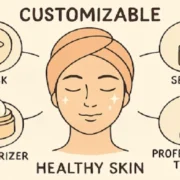How can women customise their diets to meet their changing nutritional needs throughout different life stages? What role do personalised health plans play in promoting well-being? Understanding the unique dietary requirements at each stage of life is crucial for women to maintain optimal health. Enrolling in online health courses can provide valuable insights into creating personalised dietary plans that cater to these varying needs.
Enhancing Your Knowledge with Nutritionist Courses
Enrolling in nutritionist courses online provides an opportunity to deepen your understanding of dietary practices tailored for women. These courses cover a wide array of niches, including the nutritional needs during adolescence, pregnancy, and menopause. With this understanding, you may make wiser choices about your health and well-being as you progress through life.
The flexibility of online courses allows you to fit learning into your busy life, whether you are a young professional, an expectant mother, or experiencing the changes of menopause. By dedicating time to these courses, you invest in your long-term health.
Nutrition for Adolescence and Young Adulthood
Adolescence and young adulthood are key stages in developing good eating habits. During these years, women need nutrients that support growth, hormonal balance, and overall development. Key nutrients include calcium, iron, and folic acid.
Calcium is essential for bone development, while iron supports energy levels and cognitive function. Folate or Folic acid is crucial for reproductive health, particularly for those who may become pregnant. Combining a range of nutrient-dense foods into the diet helps meet these requirements and lays the groundwork for a healthy lifestyle.
Customising Diets for Pregnancy and Breastfeeding
Women require additional nutrition throughout pregnancy and breastfeeding to support their own health as well as their baby’s development. Essential nutrients during this stage include folate, iron, and omega-3 fatty acids. These nutrients play a significant role in fetal growth and maternal well-being.
Folate helps prevent neural tube defects, iron supports increased blood volume, and omega-3 fatty acids contribute to brain development. Online dietary courses can provide detailed guidance on how to meet these increased health needs through a balanced diet and appropriate supplements. Proper nutrition during pregnancy and breastfeeding promotes optimal health for both mother and child.
Managing Nutritional Needs During Menopause
Menopause brings about significant hormonal changes that affect health requirements. During this stage, women may experience symptoms such as hot flashes, weight gain, and bone density loss. A diet rich in phytoestrogens, calcium, and vitamin D can help manage these symptoms.
To effectively incorporate these essential nutrients, consider the following:
- Phytoestrogens: These can be found in soybeans, flaxseeds, and whole grains.
- Calcium and Vitamin D: These can be found in foods such as fortified dairy products, leafy greens, fatty fish, and fortified cereals.
Adjusting dietary habits to include these nutrients can alleviate menopausal symptoms and support overall health. Personalised nutrition plans tailored to this life stage are beneficial.
Nutritional Strategies for Active Women
Active women and athletes have unique dietary requirements to support their physical activity levels. Key nutrients for active women include protein, carbohydrates, and electrolytes. Protein promotes muscle repair and growth, whereas carbs supply the energy required for exercise.
Electrolytes, including sodium and potassium, are vital for staying hydrated and preventing muscle cramping.
Online courses can teach women how to balance these nutrients to enhance athletic performance and recovery. A well-planned diet helps active women achieve their fitness goals and maintain their health.
Adapting Nutrition for Ageing
As women age, their metabolism and health needs change. Older women may require fewer calories but need more of certain nutrients, such as fibre, vitamin B12, and antioxidants. These nutrients support digestive health, energy production, and protection against chronic diseases. To effectively incorporate these vital nutrients, consider the following:
- Fibre: Abundant in fresh produce, vegetables, and whole grains, it promotes digestive health
- Vitamin B12: Important for nerve function and energy levels
Incorporating these nutrients into the diet helps manage the ageing process and maintain vitality. Personalised nutrition plans can address specific health concerns and dietary needs of older women.
The Role of Supplements
While a well-rounded diet is the foundation of optimal nutrition, supplements can assist in filling up the gaps where dietary consumption is inadequate. Key supplements for women at various life stages include calcium, vitamin D, iron, and omega-3 fatty acids. These supplements support bone health, immune function, and overall well-being.
It is critical to select high-quality supplements and consult a healthcare expert to ensure they suit your specific requirements. Online nutritionist courses often include modules on supplement use, helping you make informed choices to support your health.
Online nutritionist courses provide valuable knowledge on maintaining diets to support growth, hormonal changes, and aging. Women can optimise their focus and energy levels by understanding the importance of nutrients and how to incorporate them into daily meals. Remember, investing in health education is a step towards a healthier life. With the proper knowledge, women can make informed dietary choices that promote well-being and longevity.
Unlock Your Ultimate Well-Being: Surprising Health Hacks You Never Knew










Comments